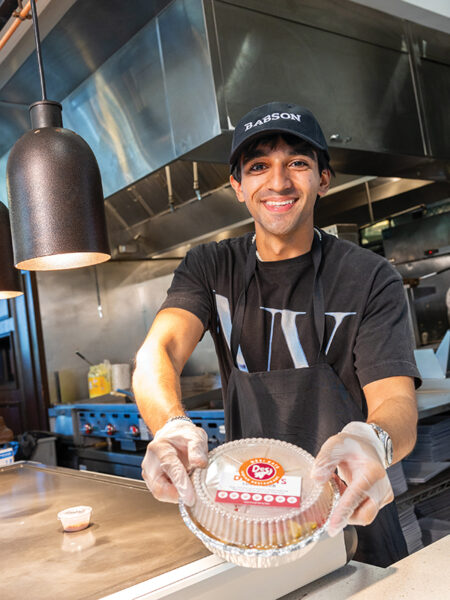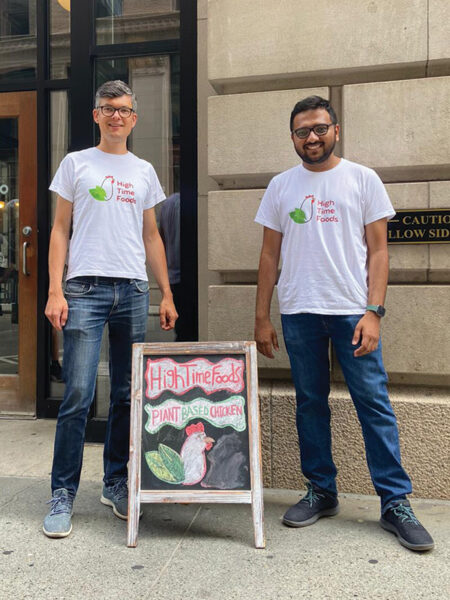The Food Network of Babson

The food began to run out, and the timing couldn’t have been worse.
Krish Khemlani ’27 had spent months working on his venture, an Indian eatery called DesiEats, a startup that can trace its roots back to his high school years, when he would work on recipes side by side with his mother in the family kitchen.
Khemlani was so focused on starting a venture that he transferred from New York University, after only one semester, to the entrepreneurial campus of Babson College. He says it’s hard to quantify how much time he has spent on DesiEats, which he envisions as a Chipotle of Indian cuisine, offering healthy food made with fresh, quality ingredients. “I am always thinking about it. I am always working on it,” he says. “It’s a very big part of my life.”
READ MORE IN BABSON MAGAZINE: Culinary Connections Among Babson’s Alumni.
All of that work, all of that planning and dreaming, all of that single-mindedness, had led up to a pivotal moment last spring: a pop-up at Roger’s Pub. The pop-up was an audition of sorts. If it went well, if customers actually showed up and liked the food, then Babson College Dining, which operates all of the institution’s eateries, was expected to make DesiEats a permanent fixture on campus the next school year. “That’s why it was crucial—to see if people were willing to spend money on the food I made,” he says.
Customers did indeed show up for the pop-up, so much so that the food began to run out. “People were complaining there was no sauce,” Khemlani says. “People were complaining about how little food they were getting for what they paid for.”
Khemlani kept his cool. He and Babson Dining staff rushed to the kitchen and whipped up more food. “We had to deal with those issues on the fly without getting stressed or scared,” he says.
BABSON MAGAZINE: Read the complete Winter 2025–2026 issue.
In the end, more food was made, customer feedback was excellent, and DesiEats was given the green light to set up shop on campus this fall, serving patrons every Wednesday, Thursday, and Friday at Roger’s. To be given such an opportunity is a remarkable achievement for a college junior, and Khemlani is grateful for all the feedback, fine-tuning, and collaboration he received from Babson Dining.
“Babson is so open to helping by whatever means necessary,” Khemlani says. “Without their support, this wouldn’t have been possible. It’s the reason I transferred here.”
Khemlani is just one of many Babson student and alumni entrepreneurs whose focus is food. Together, they form a loose community of startups and more established ventures seeking to fill bellies and grow their businesses. That community is fostered with guidance and a helping hand by Babson College Dining.
On the Menu: Classic Indian Dishes

John Pagano is plugged into the Babson food community. As the resident district manager of Babson Dining, he networks with alumni companies, purchasing their food for campus eateries and events (see sidebar on alumni food businesses). He also connects with students. Through emails and casual conversations, they are constantly reaching out, seeking input on their multitude of entrepreneurial ideas.
Student proposals run the gamut: restaurants, food trucks, consumer packaged goods, beverages, bakeries, agriculture. “The creativity here at Babson never stops surprising me,” Pagano says. Not all of those ideas progress far, but for those that do, Pagano and his staff are ready to help with a slew of needs, including branding, packaging, procurement, product positioning, and food safety. “Whether the venture is large or small,” he says, “the goal is always the same: to provide real-world experience and meaningful support.”
By working with entrepreneurs, Babson Dining also benefits, its staff learning about the types of dishes students and patrons are clamoring for. “We have a better pulse on what is going on,” Pagano says.
While dining operations at other colleges may collaborate with their students and alumni, Pagano believes they don’t bring the same commitment that Babson does. “These partnerships are not performative gestures that check a box,” he says. “They are strategic and built on mutual value, long-term potential, and real revenue.”

An example of that is Khemlani’s DesiEats. Raised in Puerto Rico, a child of parents who emigrated from India, Khemlani has been working on the recipes for DesiEats since high school.
Overweight as a child, Khemlani was obsessed with creating healthier versions of classic Indian dishes such as butter chicken and palak paneer. Early in the morning, before he went to school and his mother, Bhawna, went to work, they listened to music and drank coffee while they tinkered in the kitchen.
Khemlani did taste tests for family and friends, asking if they could tell the difference between the regular and healthy versions of a dish. His sister, Isha, always could. “My sister was the hardest critic ever,” he says.
Khemlani brought those recipes with him to college, and before that critical pop-up in Roger’s, Babson Dining allowed Khemlani to serve his food three times in Trim Dining Hall. Babson Dining provided all the ingredients, and Khemlani taught dining staff how to cook his dishes. After each of those three sessions, he solicited feedback from students. “You get as much feedback as possible to make it better,” he says. “Babson preaches this.”
“Babson is so open to helping by whatever means necessary. Without their support, this wouldn’t have been possible. It’s the reason I transferred here.”
Krish Khemlani ’27, founder of DesiEats
One of his biggest challenges was figuring out how to scale his recipes. At home, Khemlani might cook for 20 people at most. Now, he needed to feed 400 or 500 at a time. During those Trim sessions, he honed his recipe for such a large crowd. For extra practice, he cooked at a community kitchen at a local church, donating all the meals he prepared to those in need.
Now that DesiEats has earned a permanent spot at Roger’s Pub, Khemlani is looking to open DesiEats at more colleges in 2026. His goal is 10. “There is still a lot more work to do,” he says.
On the Menu: Plenty of Protein

Another company working with Babson Dining is High Time Foods, a provider of a plant-based, protein-rich, and shelf-stable mix that can be used in a variety of dishes.
Based in Cambridge, Massachusetts, High Time Foods is very much a Babson company. Co-founder and CEO Aakash Shah MBA’21 won the College’s prestigious B.E.T.A. (Babson Entrepreneurial Thought & Action®) Challenge in 2021, and he met his fellow co-founder, Damian Felchlin MBA’21, as a student.
Through the years, the company has received critical support from Babson Dining, and even now, even though he graduated several years ago, Shah will pop by Trim and leave food in his usual spot for dining staff to sample. “I go to the freezer and drop it off,” he says. “I know where I can keep my samples.”
Before starting High Time, Shah worked in various positions in the food industry. He ran multiple ghost kitchens, and he was an early employee of a thriving food tech company. He grew up in Chennai, India, and like so many, he relished his mother’s cooking, especially her dosa. “I could eat that every day until the last day of my life,” he says.
Shah has thought much about the problems in the food industry, especially in regard to meat production, which causes significant carbon emissions and yields a product that’s too expensive for many people around the world. “I don’t think protein is only meant for the privileged,” he says. “I want to create protein accessibility.”

That’s why High Time’s mix being shelf stable is so essential. Refrigeration isn’t common in much of the world. “That works in North America,” Shah says, “but if you are in India, or Africa, or South America, infrastructure is not built to sustain frozen products.”
Babson Dining has helped High Time make some key connections. When the College hosted a regional meeting of a large dining services provider for educational institutions, Shah was allowed to share his food and his venture’s story with attendees. As High Time staffed a booth at a national conference for collegiate food operators, Pagano stood nearby, vouching for the company.
Babson Dining also nudged High Time to expand its offerings. In a meeting with the College’s chefs, Shah demonstrated how High Time’s mix could be used to make dumplings. The chefs countered that making the dumplings at the scale they needed would be unrealistic for them to do, but if High Time made the dumplings, Babson would buy them.
As a result, High Time started a subsidiary, Street Food Lab, which sells appetizers made with its protein-rich mix. “Babson pushed me to think about this direction,” Shah says.
Street Food Lab highlights global cuisine with its appetizers: Thai spring rolls, Nepali momo dumplings, Argentine empanadas, Italian ravioli, Indian keema samosas, and Jamaican patties. In its marketing, Street Food Lab emphasizes the protein in its food, but not where that protein originates. It doesn’t want to scare away customers who don’t see themselves as vegetarians.
“We’re not talking about whether it is made or not made with animals. People don’t want to hear about changing their food habits,” he says. “The core message is about people wanting to try these amazing food items from around the world.”
“I am always able to go back to (Babson Dining). They are outstanding people to work with. The Babson ecosystem is awesome.”
Aakash Shah MBA’21, co-founder of High Time Foods
Shah has big ambitions for High Time, which earlier this year completed a $1.2 million seed round of funding. “When someone thinks of a protein company, they should think of us,” he says. “We want to be the largest protein company in the world.”
Just like Khemlani, Shah is grateful for all the help that Babson Dining has given him. It remains a sounding board, a place he can go for honest feedback.
“I am always able to go back to them. They are outstanding people to work with,” he says. “The Babson ecosystem is awesome.”
ON TAP: Food and Beverage Business Lab
A new resource for culinary entrepreneurs and the Babson community is coming next spring with the launch of the new Food and Beverage Business (FABB) Lab at the Arthur M. Blank School for Entrepreneurial Leadership.
The FABB Lab will support, connect, and amplify much of the work on campus, in addition to offering new opportunities, to catalyze entrepreneurial leaders in creating food solutions. The lab will collaborate with student clubs and Babson College Dining to support Dinner in Green with programming to highlight alumni-led and local sustainable food and beverage businesses.
The FABB Lab also will provide funding for several Babson initiatives, including research and faculty grants related to food and beverage, career development in the industry, a special award at the B.E.T.A. Challenge, sustainability interns, and scholarships for a short course (A Gratitude Journey for Bananas) focused on marketing innovation and responsible supply chains in Costa Rica in March.
Learn more about the Food and Beverage Business Lab




